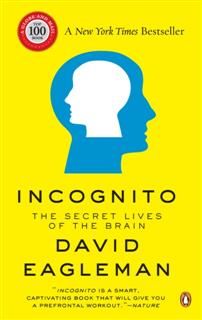Incognito
- Godina izdavanja
- 2011
Utisci
- 洪一萍je podelio/la utisakпре 5 година🔮Kompleksna
Biology and brain research has revealed that instead of asking, “What's the best way to solve that problem?” We should ask, “Are there multiple, overlapping ways to solve that problem?”
Thoughts don't seem like physical things. They don't seem like they exist in a tangible form, but that's exactly what is going on. The physical structure of the brain determines the thoughts that flow from it.
Consciousness is the smallest player of our mind. Most of our brain operates in a hidden mode.
When you say, “I just got an idea!” You are actually referencing all sorts of work your brain has been doing behind the scenes for minutes, days, or months.
There is a concept that a conscious idea is actually a collection of signals your brain picks up that all point in the same direction. Once the signal becomes strong enough, it becomes a conscious thought. If you brain gets a signal that points one way and another pointing a different way, then they sort of cancel one another out. It's like the brain needs enough unconscious votes before it generates a conscious thought.
I like the concept of your mind as an iceberg. Conscious thought is just the visible tip. Unconscious thought is the mass beneath the water.
The only way society functions is by groups of people consciously focusing on things. Whether I'm on a plane or not, I never think about pre-flight procedures, how much gas is in the plane, whether the landing gear is working well, and so on. but I don't need to think about those things because someone else is consciously focused on them. This is how we build well-functioning teams and societies. We are all running on autopilot in nearly every area of life, but each of us has the capacity to be consciously focused on a few things. Divide those areas of focus up in smart ways and you get a really effective team.
The brain is organized like a marketplace, not an assembly line. Even tasks that are historically depicted at a straight line (vision, for example) are actually the result of a network or inputs (vision is impacted not just by light, but also by sounds, etc.). This means that the entire world as you know it is not a simple series of cause and effect relationships. Rather, there are many tiny causes that build into some final effect. There are many bits of information that impact vision.
People tend to love reflections of themselves in others and on products. This is called “implicit egotism.” We like people who share our birthdays, have names similar to our, and so on.
Humans have an incredible ability to learn and, with enough practice, mindlessly automate almost any skill.
The mere exposure effect proves that our brains tend to like things that we are exposed to often. Similarly, we tend to associate two things with one another if we hear that pairing often. (This reminds me of people who say they have “great networks” over and over. Eventually, you associate the two things together and you're like “That guy is a great networker! He has tons of amazing contacts.” Mere exposure effect at work — and with hustle on that guys part it can become a reality too.)
The conscious mind is not the one driving the boat.
The personalities we think of as ourselves are time averaged versions of our neurobiology. - Kelvin Tjiawije podelio/la utisakпре 5 година👍Vredna čitanja🔮Kompleksna
Citati
- Vasily Betinje citiraoпре 9 година“There’s someone in my head, but it’s not me.”
- Olga Krutskoje citiralaпре 4 годинеOur brains run mostly on autopilot, and the conscious mind has little access to the giant and mysterious factory that runs below it.
- Olga Krutskoje citiralaпре 4 годинеThe first thing we learn from studying our own circuitry is a simple lesson: most of what we do and think and feel is not under our conscious control. The vast jungles of neurons operate their own programs.


